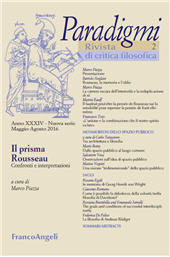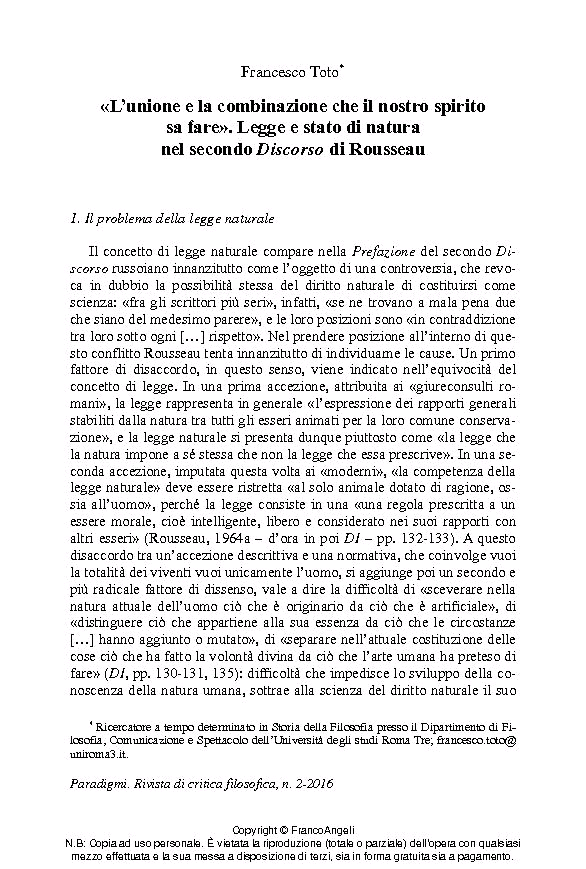L'unione e la combinazione che il nostro spirito sa fare : legge e stato di natura nel secondo Discorso di Rousseau
83-100 p.
Questo articolo mira a chiarire alcune difficoltà relative al senso e al ruolo della legge di natura nella prima metà del Discorso sulla diseguaglianza. La prima riguarda il rapporto tra l'amore di sé e la pietà, le due passioni nelle quali Rousseau riconosce la radice pulsionale della legge di natura. La seconda riguarda invece la capacità di questa legge di applicarsi all'abitante del puro stato di natura, a quell'uomo naturale che sembra distinto dall'uomo civilizzato dalla puntuale soppressione di tutto ciò che, distinguendolo dall'animale, ne renderebbe possibile la moralità. Per risolvere queste difficoltà l'autore si concentra sui passi apparentemente marginali nei quali Rousseau prende in considerazione i rapporti dell'uomo con gli altri esseri viventi in generale e con i propri simili in particolare. Attraverso l'analisi del trattamento di una serie di casi particolari, dimostra in primo luogo l'erosione alla quale è assoggettata la pietà in quanto principio autonomo e possibilmente conflittuale risp
etto all'amore di sé, e in secondo luogo il carattere fondamentalmente utilitaristico che questa subordinazione della prima pulsione alla seconda attribuisce alla morale del Discorso: una morale che, hobbesianamente, non ammette nessun giudizio legittimo al di fuori di quello che gli individui portano su sé stessi, e il cui confine rispetto alla violenza rischia perciò di divenire evanescente [Testo dell'editore].
The aim of the article is to shed light on two problems, regarding the meaning and the role of the law of nature in the first half of Rousseau's second Discourse. The first problem concerns the relationship between self-love and pity, that is, the two passions that Rousseau identifies as the fundamental drives of the law of nature. The second one concerns the way in which this law can effectively act upon men who live in the pure state of nature, since men in the pure state of nature seem to lack that kind of intelligence and freedom which are necessary to the development of any sort of morality. In order to solve these problems, the author of the article focuses on passages of the Discourse that are rarely taken into account by scholars, regarding in particular the way in which men interact with each other and, more generally, with other living beings. Through the analysis of specific cases, he demonstrates how in the Discourse the role of pity, first understood as an autonomous principle that can possibly s
tand in the way of self-love, is gradually marginalised in favour of self-love. Then, he shows how this subordination of the former passion to the latter leads towards a fundamentally utilitarian account of morality. As in Hobbes, also in Rousseau's second Discourse no judgment is considered morally valid, except for the one that individuals may have of themselves. The boundary between moral actions and violence can therefore become vague and vanishing. [Publisher's Text].
-
Articles from the same issue (available individually)
-
Information
ISSN: 2035-357X
DISCIPLINES
KEYWORDS
- Amore di sé, Facoltà, Legge naturale, Morale, Pietà, Rousseau
- Faculties, Morality, Natural law, Piety, Rousseau, Self-love



